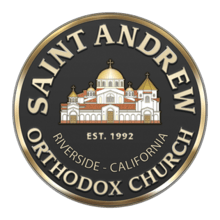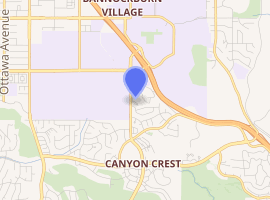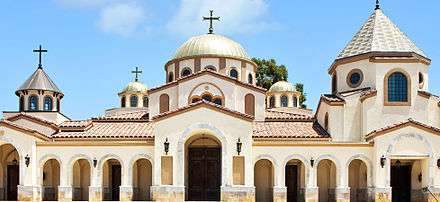Saint Andrew Orthodox Christian Church
Saint Andrew Orthodox Christian Church is a parish church of the Antiochian Orthodox Christian Archdiocese of North America, an archdiocese of the Greek Orthodox Patriarchate of Antioch and All the East. The church is dedicated to Saint Andrew, the First-Called Apostle, is near the intersection of Canyon Crest Drive and Martin Luther King Boulevard in Riverside, California, across from the University of California, Riverside.

| Saint Andrew Orthodox Christian Church | |
|---|---|

| |
| Location | 4700 Canyon Crest Drive Riverside, California |
| Denomination | Greek Orthodox |
| Membership | 600 |
| Weekly attendance | 400 |
| Website | www |
| History | |
| Founded | 1992 |
| Consecrated | December 3, 2011 |
| Relics held | St. Eugene, St. Athanasius of Alexandria, St. Raphael of Brooklyn, St. Andrew the Apostle |
| Architecture | |
| Architect(s) | CJK Design Group of San Francisco |
| Architectural type | Byzantine |
| Groundbreaking | 12 Oct 2008 |
| Completed | 2010 |
| Construction cost | $5 million (est.) |
| Specifications | |
| Capacity | 700 |
| Number of domes | 7 |
| Materials | Marble |
| Administration | |
| Diocese | Antiochian Diocese of Los Angeles and the West |
| Clergy | |
| Archbishop | Metropolitan Joseph (Al-Zehlaoui) |
| Priest(s) | V. Rev. Fr. Josiah Trenham |
| This article forms part of the series | ||||
| Eastern Orthodox Christianity in North America | ||||
|---|---|---|---|---|
 | ||||
| History | ||||
| People | ||||
| Jurisdictions (list) | ||||
|
||||
| Monasteries | ||||
| List of monasteries in the United States | ||||
| Seminaries | ||||
| Organizations | ||||
|
||||
The church building, modeled after a 13th-century World Heritage Site in Thessaloniki, Greece named for St. Catherine of Alexandria, was completed in 2011 as the first Byzantine-style Orthodox Christian church in Riverside.
History
Saint Andrew Orthodox Church began in 1989 as several families from Riverside neighboring Corona began meeting weekly for prayer services with the blessing of the local bishop. While there was no full-time priest to serve the community, the four founding families began to run local ads, produce a monthly newsletter and conduct outreach. In November 1992 the mission station was granted formal mission status and given the name "Saint Andrew" by the late Metropolitan Philip Saliba. In November 1997, Saint Andrew Mission was elevated to official "church" status by then Archbishop Joseph Al-Zehlaoui of the Diocese of Los Angeles and the West, and Father Paul Finley was assigned as pastor. At this time the parish relocated their worship from a storefront to two industrial warehouses in west Riverside. On May 1, 1998, Father Josiah Trenham was appointed as the pastor. During his tenure the membership of Saint Andrew grew, and worship, educational, and catechism programs were implemented.
Church building

With a rapidly growing parish, the Saint Andrew community sought land of their own in which to build a traditional Orthodox-style church. In 1999, the parish purchased its first real estate property at its current location. This same year, the Riverside City Council approved a three-phase construction plan consisting of a Fellowship Hall (Phase 1), a Church Temple (Phase 2), and a Christian Education Center (Phase 3).
Construction of the Fellowship Hall was completed in 2002; it served as the interim worship center until the Church Temple was completed in 2011. In 2004 Saint Andrew acquired an additional three-acre lot adjacent to their current property. This acquisition more than doubled the size of the Saint Andrew campus and a major redesign of the building plans was enacted. The temple was modeled after the St. Catherine Church in Thessaloniki, Greece.
Ground was broken on October 12, 2008, in a ceremony presided over by Bishops Joseph of Los Angeles and the West and Benjamin of San Francisco of the Orthodox Church of America.
The basic design of the church is a large cross within a square. Much marble stone is used, both on the inside and outside of the structure. The marble comes from seven different nations and over a dozen quarries. There are seven distinct domes, 74 arches, 14 barrel vaults, 16 groin vaults, 8 inverted convex ceiling domes and a central dome.
The church was built oriented toward the east, in accordance with tradition. On the western side there are eight doors which were handcrafted and carved in Antakya, Turkey. According to the Christian New Testament, this ancient city is where the disciples of Christ were first called Christians. The central grand doors stand 12 feet (3.7 m) tall and 7 feet (2.1 m) wide. Each is made of solid quercus kelloggii, a black oak. The images carved within the doors depict Christ, the Holy Virgin Mary, Saint Andrew, Saint Peter, Saint John Chrysostom, Saint Anthusa, Saint Simeon the Stylite and Saint Simeon of the Admirable Mountain.
A small plaza with tumbled travertine leading up to the main entrance of the church was inspired by a 6th-century monastery in Saidnaya, Syria, built by the Emperor Justinian.
Hanging in the Saint Andrew belfry are five bells cast in Russia. Fourteen chandeliers, made in Athens, Greece, light the interior of the temple and the church's baptismal chapel.
The iconography of the church is hand-painted by Orthodox-iconographer monks from Buena Vista, Colorado. The iconography, depicting scenes from Christ's life, his miracles, parables and hundreds of saints, was still in progress in 2013, and would be one of the most elaborate iconographic schemes in the US when completed, with no wall space remaining unadorned. Cost was estimated to be in the millions of dollars, with completion planned for 2021.
Sunday services at Saint Andrew are attended by over 400 people, with seating for only half that number; the Orthodox tradition maintains that standing is the proper disposition during worship.
The first Divine Liturgy was celebrated in the new church temple on the Orthodox Feast of Palm Sunday, 2011.
The temple was formally opened with the Service of Consecration on December 3, 2011, presided over by Bishops Joseph and Benjamin, and attended by over sixty priests and deacons, and hundreds of laity.
Administration
In 1998 Father Josiah Trenham, a native Southern Californian ordained in 1993, became pastor. He is an adjunct professor of theology at St. Katherine College in Encinitas, California. Father Josiah is the founder and director of Patristic Nectar Publications, a company which sells religious audio recordings. He serves on the Board of Advisors of the Ss. Cyril and Athanasius Orthodox Institute in San Francisco. He is a member of the Orthodox Theological Society of America, and participates in yearly academic forums and symposia as well as conducting numerous parish retreats each year throughout the United States and Canada. Father Josiah became a member of the Secretariat of the Assembly of Canonical Orthodox Bishops on its inception in May 2010. Father Josiah is married and has 10 children.
Ministries and community outreach
Burial Society
The Saint Andrew Burial Society is a ministry of the church designed to prepare the body of reposed parishioners for funeral and burial. Two teams of parishioners, one male and one female, have been trained by a local mortuary in proper burial preparations that accord with Orthodox Christian Tradition. Many families of the deceased choose not to employ the services of a mortuary or funeral home, relying entirely on the Burial Society in the traditional practices of Christian burial. The dead can be preserved and lie in state in a purpose-designed parish funeral chapel.
Feeding the homeless
The St. Andrew Church homeless ministry serves food at the Hulen Homeless Shelter in Riverside twice a month. The shelter, operated by Path of Life Ministries, offers a thirty- to sixty-day program that provides adults with temporary housing and assistance in obtaining important documents, job readiness, computer workshops, counseling, meals, hygiene supplies and Bible studies. The shelter holds 129 beds for qualified single men and women in separate dormitories.[1]
Volunteers from St. Andrew give their time and resources.
Bookstore
In 2002 the St. Andrew Church bookstore opened on the south side of the Fellowship Hall, selling books on Orthodox spirituality and living, icons, Byzantine music, patristic writings of the Holy Fathers and the Orthodox faith, lives of the Saints, children's books, crosses, prayer ropes, vigil lamps, charcoal, incense, and products from various local monasteries, including pure honey.
Riverside Greek Fest
Each fall St. Andrew hosts The Riverside Greek Fest, a city-sponsored event. The 2013 event was said to "bring a little bit of art and culture to the city" and "fully immerse you in the Greek culture". The event includes Greek cuisine, traditional folk dancing, and tours of the Byzantine-style temple.[2][3]
In 2013, the Riverside Greek Fest attracted nearly 10,000 visitors, including city officials, and was the 3rd largest event of its kind in Riverside.
Save the Cross
In 2012 the group Americans United for Separation of Church and State notified the city of Riverside it would sue if a cross that had stood atop publicly owned Mount Rubidoux since 1907 was not removed. The pastor of St Andrew created a Web site and organised cross supporters after Riverside started considering whether to sell the cross site.[4] He told the council he would chain himself to the cross to prevent its removal;[5] ultimately local groups bought the land to allow the cross to remain.[6]
See also
- Antiochian Orthodox Christian Archdiocese of North America
- Assembly of Canonical Orthodox Bishops of the United States of America
- History of the Eastern Orthodox Church in North America
References
- "Family Shelter Program". Path of Life Ministries. Retrieved 2015-10-28.
- Robinson, Alicia (3 October 2013). "RIVERSIDE: St. Andrew church holds Greek festival". PE.com. Archived from the original on 29 April 2014.
- "Residents take part in Greek Festival". YouTube. The Press-Enterprise. 2013-10-05. Retrieved 2015-10-28.
- PE.com:RIVERSIDE: Church to distribute signs, information about Mt. Rubidoux cross, 28 December 2012
- Robinson, Alicia (14 November 2012). "Mount Rubidoux cross fate on hold". PE.com. Retrieved 28 October 2015.
- The Press-Enterprise: MOUNT RUBIDOUX CROSS: Auction winner will keep Riverside landmark, 11 April 2013
- Notes